More than one in four adults 65 and older fall each year. (1) Adding accessibility features and slightly modifying your home are two ways you can reduce fall risks. (2) However, investing in a medical alert system is also a great safety tool, especially if you live alone.
While medical alert systems can’t prevent falls, they can contact a 24/7 monitoring center for immediate assistance during an emergency. The monitoring center agent dispatches first responders, contacts loved ones, or both. Alert1’s at-home and mobile medical alert systems can help you feel safer and more secure and bring peace of mind to your family.
Our favorite Alert1 medical alert system
The On-the-Go Wristband is our favorite Alert1 medical alert system. It’s a discreet, comfortable medical alert bracelet resembling an Apple Watch or fitness tracker. We like that the mobile system doesn’t have a touchscreen or other apps to navigate—just a help button and a two-way speaker right on your wrist that connects to a 24/7 monitoring center.
Our picks for the best Alert1 medical alert systems
Compare Alert1 medical alert systems
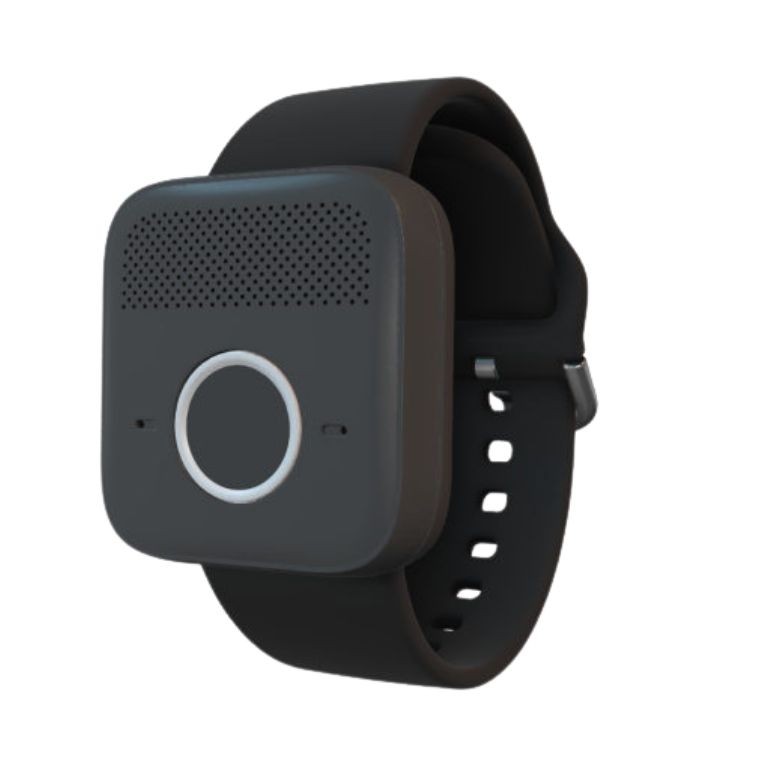
|
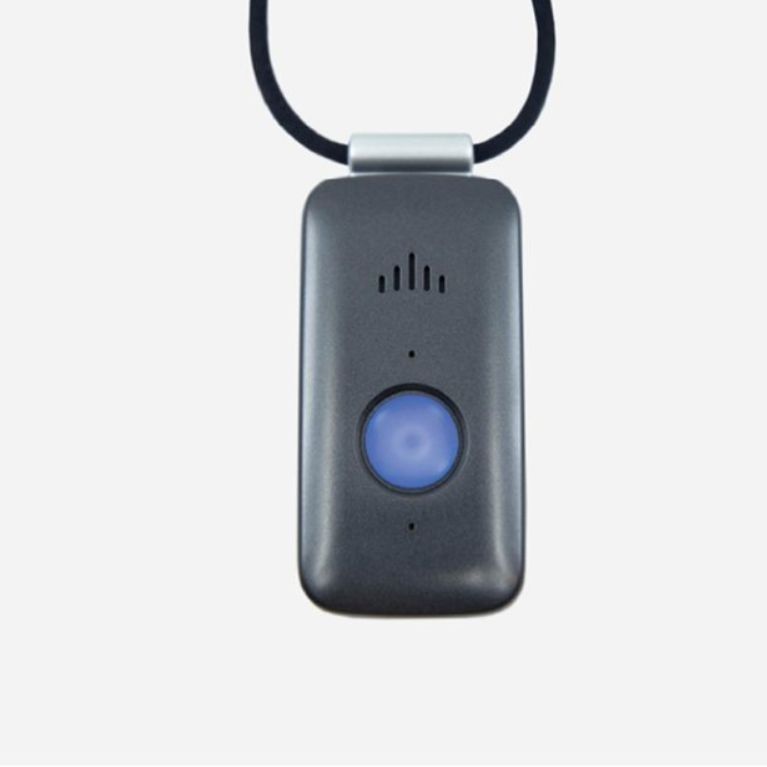
|
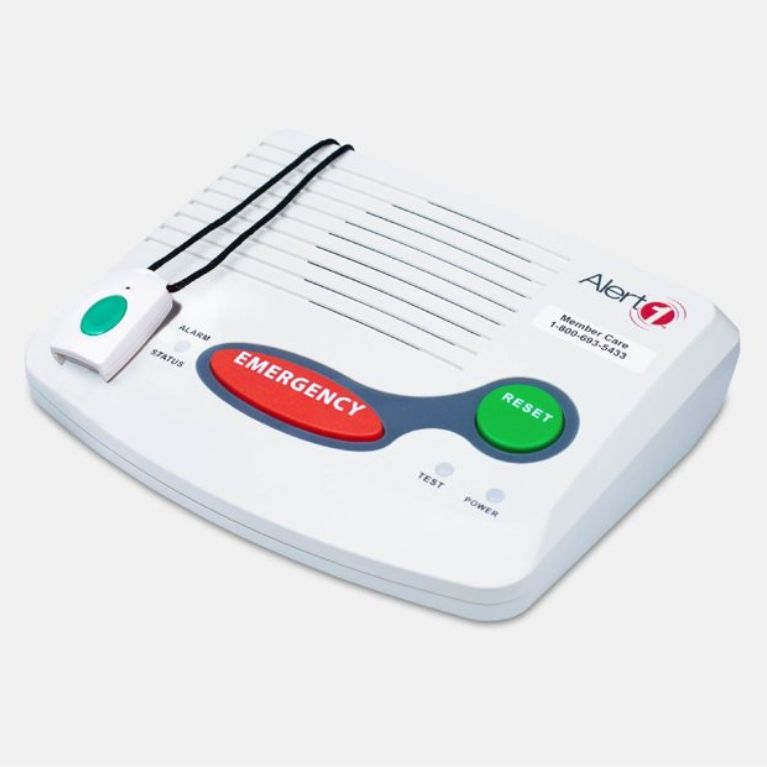
|
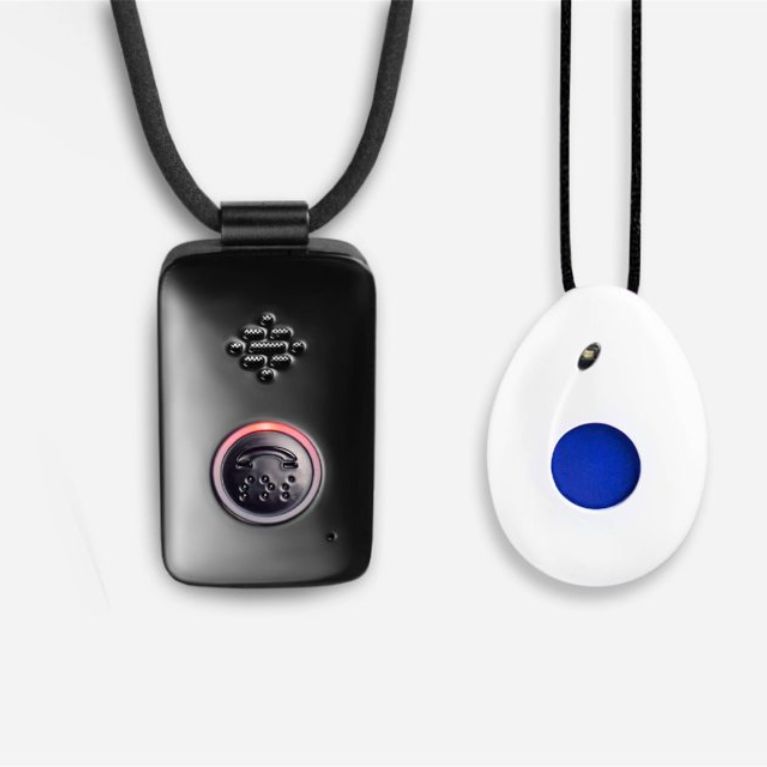
|
|
| Alert1 On-the-Go Wristband Medical Alert | Alert1 On-the-Go Medical Alert | Alert1 In-Home Medical Alert | On-the-Go + In-the-Home + Fall Detection Medical Alert Bundle | |
| Rating | ||||
| Price (monthly) | $38.95 | $38.95 | $28.95 | $58.95 |
| Activation fee | $19.95 | $19.95 | $19.95 | $19.95 |
| Fall detection | Yes, $10/month | Yes, $10/month | Yes, $10/month | Yes |
| Battery life | 24–48 hours | 30 days | 24 hours (backup) | 24 hours (base unit), 30 days (mobile system) |
| In-home range | Unlimited | Unlimited | 600 feet | 600 feet (base unit), Unlimited (mobile system) |
| Caregiver tracking | No | No | No | No |
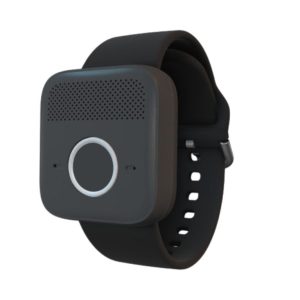

Key product features
What you should know
The Alert1 On-the-Go Wristband connects to a 24/7 monitoring center anywhere with cell service. The simple bracelet has a help button and a two-way speaker, allowing you to talk with the monitoring center agent from your wrist. Fall detection is available for $10 per month.
- The bracelet is a more discreet option than mobile medical alert necklaces. Some users may welcome a low-tech bracelet over medical alert smartwatches.
- The On-the-Go Wristband costs $38.95 per month plus a $19.95 one-time activation fee. Shipping is free with all Alert1 subscriptions.
- You’ll save nearly $10 on monitoring per month with an annual subscription.
- Fall detection is available for an extra $10 per month. The bracelet automatically calls the monitoring center if it detects a fall.
- Alert1 doesn’t offer a caregiver app or location tracking, features that may be nonnegotiable for some caregivers.
Alert1 On-the-Go Wristband overview
The Alert1 On-the-Go Wristband follows a new trend for mobile medical alert systems. The lightweight bracelet looks like a medical alert watch or fitness tracker without extra (possibly distracting) features. Many companies now offer this same design.
The medical alert bracelet calls the monitoring center when you press the center help button or the device detects a fall. A monitoring center agent speaks with you directly from the bracelet’s two-way speaker. They can also see your location via GPS to dispatch first responders and notify your loved ones during an emergency.
We like the On-the-Go Wristband’s simple, comfortable design. Weighing 1.2 ounces, it’s lighter than a large egg and has an adjustable silicone wristband. (3) The bracelet is water-resistant, so you can safely wear it while showering, washing your hands, or exercising—it just can’t be submerged in water. (4) Alert1 recommends drying the bracelet with a towel after it gets wet.
Setting up the On-the-Go Wristband
Alert1 has online video tutorials for setting up and testing its medical alert systems. Unfortunately, this page is outdated. It doesn’t include the On-the-Go Wristband, and there is still a video for the discontinued On-the-Go Wrist Watch.
Fortunately, setting up the On-the-Go Wristband takes only a few steps, according to the user guide:
- Charge the device (it takes two to three hours to fully charge)
- Place a test call to the monitoring center by pressing the help button until it turns blue, then release
- Confirm with the monitoring center agent that you’re testing your device
Once you’ve successfully placed your test call, your On-the-Go wristband is ready to use. If you have any issues or questions during setup, call the Alert1 Member Care team at 866-812-3820, extension 3.
Fall detection
For years, most fall detection devices were necklaces because studies show arm movements can make wrist-worn fall detection less accurate than chest sensors. (5) However, many medical alert companies are improving and updating their fall detection sensors, making them more suitable for bracelets and watches.
Build callout box: If your On-the-Go Wristband accidentally triggers fall detection, you can cancel the call by pressing and holding the help button until the device verbally confirms the call has been canceled. You can also wait for an agent to answer and tell them it was a false alarm.
Additional accessories
Alert1 also offers numerous safety accessories, including:
- Medication reminder and organizer ($149.95): This medication dispenser has dosage compartments and can program up to four medication reminders daily. A verbal alarm notifies you when it’s time to take your medication(s).
- Fall protection package ($200): This package includes two wall buttons, two motion-sensor nightlights, an 18-pack of adhesive tub strips, and 12 guards to cover sharp corners in your home. The wall buttons are compatible with the In-the-Home system. When you press the wall button, the base unit contacts the monitoring center. We recommend placing wall buttons near the ground in high-risk areas such as the bathroom, bedroom, and bottom of stairs. (6)
- Emergency lockbox ($39.95): A lockbox to store your house keys. The monitoring center agent shares the lockbox’s four-digit code with emergency responders so they can enter your home without damaging the front door.
- Wall buttons ($39.95): Wall buttons are only compatible with the In-the-Home system and work within 600 feet of the base unit.
- Monitored smoke detector ($10 per month): The smoke detector is compatible with the In-the-Home system and is monitored by monitoring center agents. It has a three-year battery life and low battery alarms.
- On-the-Go belt clip ($9.95): A storage pouch for the On-the-Go mobile system.
- On-the-Go Wristband clip ($9.95): Wear the On-the-Go Wristband device on your belt, pocket, or clipped to your purse.
- On-the-Go Wristand lanyard ($9.95): The lanyard allows you to turn your bracelet into a small pendant.
- Grey, blue, or purple silicone wristbands ($9.95 each): These colorful wristbands are only compatible with In-the-Home bracelets.
What customers are saying
There aren’t many third-party online reviews for Alert1 medical alert systems available. The company has a 1.07 out of 5-star rating on Better Business Bureau based on 15 customer reviews.
Most reviewers complain about the company’s poor customer service and issues with refunds. One customer reported the device didn’t work during an emergency.
We’ve featured Alert1 On-the-Go Wristband in:
Who Alert1 On-the-Go Wristband is recommended for:
The right medical alert system depends on your budget, lifestyle, and needs. We offer guidance below to help you decide if the On-the-Go Wristband is right for you or your loved one. If you’re a caregiver, empower your loved one by including them in the shopping process.
- Anyone with an active lifestyle: The On-the-Go Wristband is designed to be worn in and out of your home. You can connect to the 24/7 monitoring center anywhere with cell service, and the agent will dispatch emergency responders to your location based on GPS tracking. We recommend this discreet bracelet if you enjoy an active lifestyle outside your home, especially if you drive independently.
- Those who prefer a medical alert bracelet or watch: Although the best medical alert necklaces are lightweight and discreet, some may feel self-conscious wearing a device around their neck. The On-the-Go Wristband has a sleek, minimalist design—it looks like an Apple Watch or smart fitness tracker and weighs less than two AA batteries.
Most people associate medical alert systems with medical emergencies, but you can contact the monitoring center for medical and non-medical emergencies, such as a fire, home intrusion, or being locked out of your home.
Who Alert1 On-the-Go Wristband is not recommended for:
- Those who always leave home accompanied by a caregiver: We recommend a more inexpensive at-home system if you only need monitoring at home. Unfortunately, the Alert1 In-the-Home system is only compatible with a landline connection. Many competitors, such as Medical Guardian and MobileHelp, offer at-home systems with cellular connectivity.
- Anyone living in an area with poor cellular service: If you have poor cellular service in your area, the On-the-Go Wristband may not be reliable for connecting to the monitoring center. We recommend the In-the-Home system that connects to the monitoring center via landline.
- Adults prone to wandering: While most mobile systems have an app for caregivers to monitor their loved one’s location, Alert1 currently doesn’t offer an app. If your loved one is prone to wandering due to dementia, Alzheimer’s, or other cognitive issues, we recommend a mobile system with caregiver location tracking. (7) With Alert1, the monitoring center agents use GPS tracking to see the device’s location and dispatch first responders during an emergency.
- Anyone needing intensive, around-the-clock care: We don’t recommend a medical alert system as a replacement for in-person caregiving and assistance with activities of daily living (ADLs). (8, 9)
How we rated the Alert1 On-the-Go Wristband
We haven’t tested Alert1 medical alert systems, but our team has conducted rigorous research and mystery shopping to rate the Alert1 On-the-Go Wristband. We plan to test Alert1 devices in the near future and update our review.
Read our full medical alert system testing methodology to learn more about our scoring process.
Warranties and policies
You can purchase your Alert1 device online or by speaking with a sales team member at 1-866-812-3820, extension 1.
Monthly and annual subscriptions are available. With an annual subscription, you’ll pay for an entire year of monitoring at checkout, but you’ll receive a $10 discount on your monitoring fee each month, or nearly $120 per year.
Shipping
Alert1 covers shipping fees for FedEx standard shipping (two to three business days). If you’d like expedited shipping for your medical alert system, you can choose the following:
- FedEx Overnight: $59.95
- FedEx Saturday Overnight: $79.95
Trial period and return policy
Alert1 doesn’t require a minimum commitment period or contract, so you can cancel your subscription at any time. You’re eligible for a refund if you cancel your subscription and return your equipment within 30 days of purchasing it.
You must pay return shipping charges, and the $19.95 activation fee is nonrefundable.
Warranty
Alert1 will replace or repair your equipment if it’s damaged due to a defect in design, manufacturing, or design. This warranty doesn’t cover accidental damage or wear and tear.
A protection plan is available for $8.33 per month and covers the following:
- Free replacements and repairs for your medical alert system (once per year)
- Free shipping for new orders and replacements
- Full coverage for damaged device
Additional models from Alert1
Alert1 On-the-Go Wristband vs. On-the-Go Medical Alert
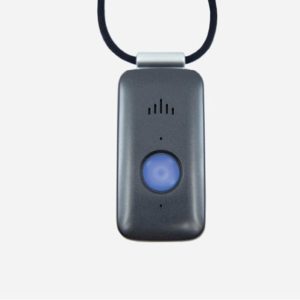

Key product features
What you should know
The On-the-Go Medical Alert necklace is similar to the One-the-Go Wristband. Both work anywhere with cell service, have a two-way speaker, and optional fall detection. Unlike the wristband, the on-the-go necklace has an extended battery life of up to 30 days after a three-hour charge.
- While caregiver location tracking isn’t available, the monitoring center can pinpoint the user’s location using GPS.
- The necklace is lightweight, weighing only 1.3 ounces.
- We like that you can wear the On-the-Go Medical Alert as a necklace, attach it to a belt clip, or tuck it away in your pocket or purse.
Alert1 On-the-Go Wristband vs. In-the-Home
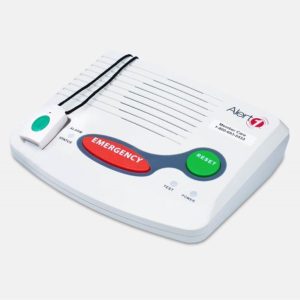

Key product features
What you should know
While most medical alert companies offer a landline and cellular at-home system, Alert1’s at-home option only connects to the monitoring center via landline. Alert1 recommends potential customers call 866-812-3820 to verify if their landline is compatible with the In-the-Home.
- Monthly monitoring costs $19.95 per month if you choose an annual subscription.
- Fall detection is available for $10 per month.
- To contact the monitoring center with the wearable help button or fall detection necklace, you must be within 600 feet of the base unit. Many competitors offer at least a 1,000-foot range.
Alert1 vs. On-the-Go + In-the-Home + Fall Detection Medical Alert Bundle
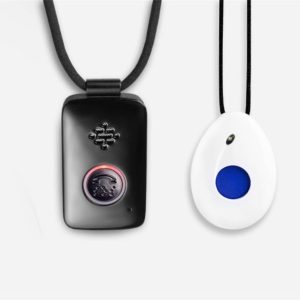

Key product features
What you should know
The On-the-Go + In-the-Home + Fall Detection bundle is excellent for monitoring two people in the same home. One person can wear the On-the-Go necklace while the other uses the wearable help button that pairs with the base unit.
- Both devices include fall detection, which is a huge perk since most competitors offer fall for an extra fee on top of the monthly cost.
- Purchasing the bundle saves money compared to purchasing both devices separately.
- If you choose a monthly subscription, the bundle costs $29.50 per device, including fall detection. If you choose an annual subscription, each device is $25 per month, including fall detection.
Alert1 vs. competitors

|
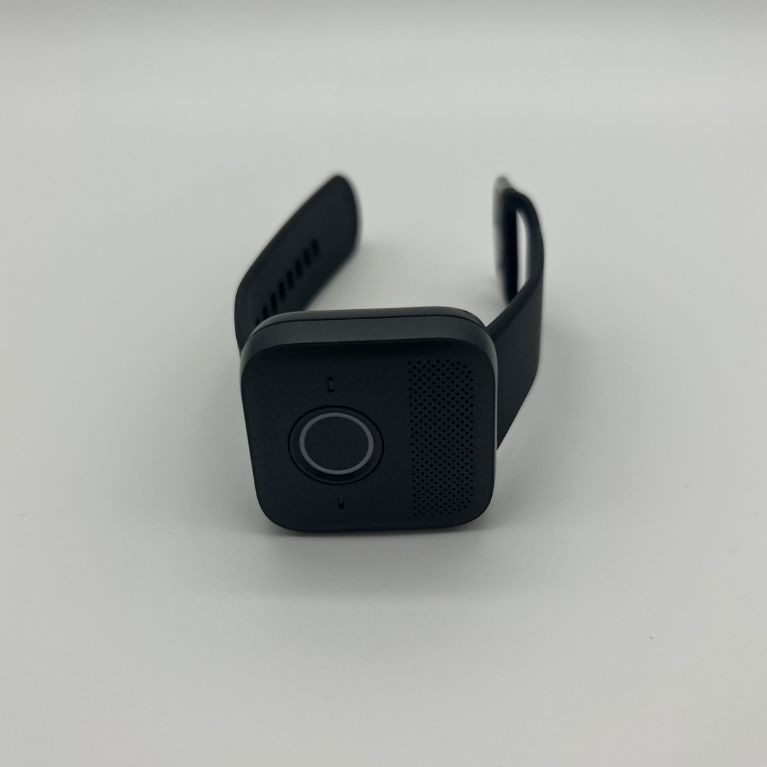
|
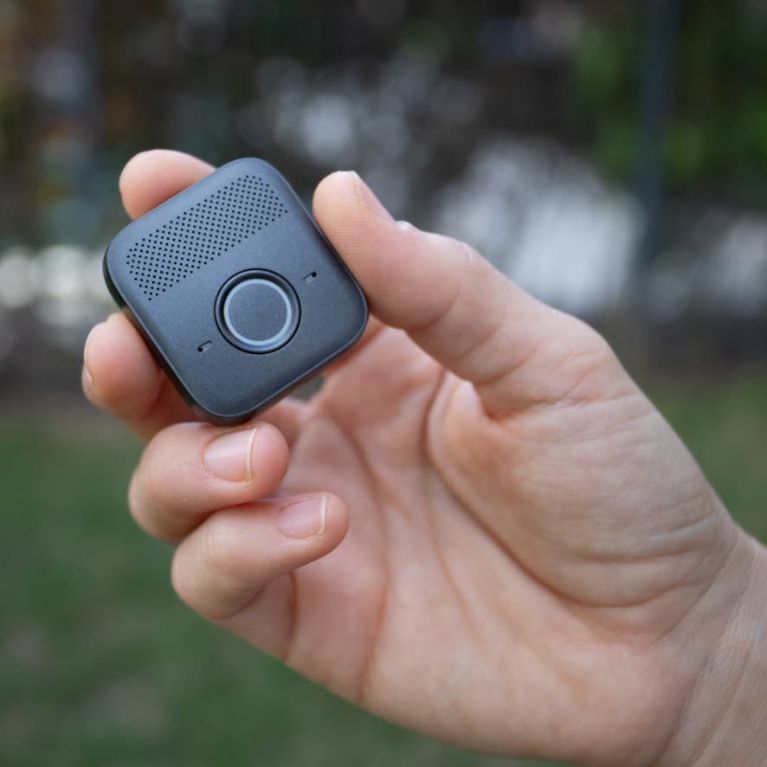
|
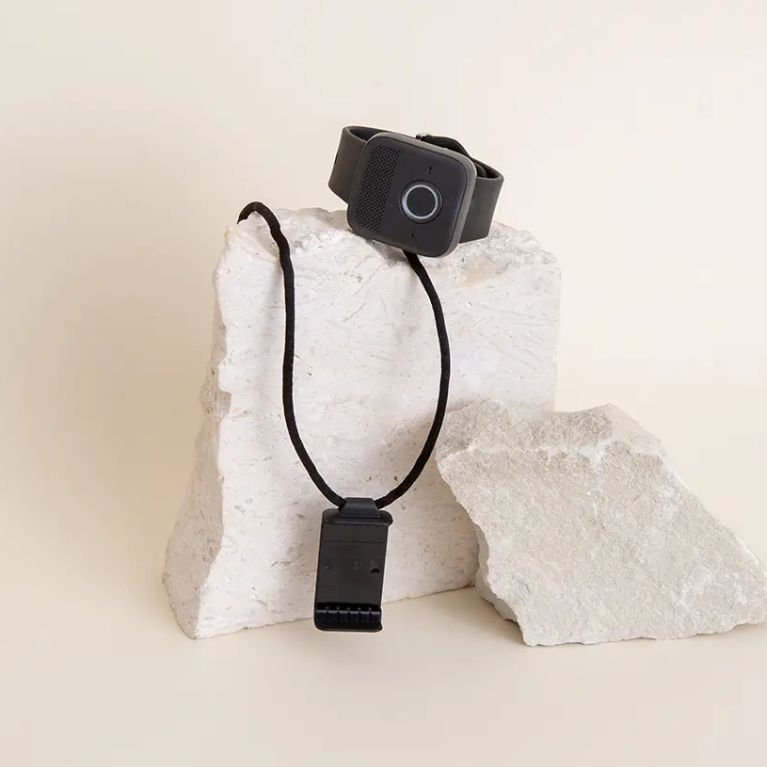
|
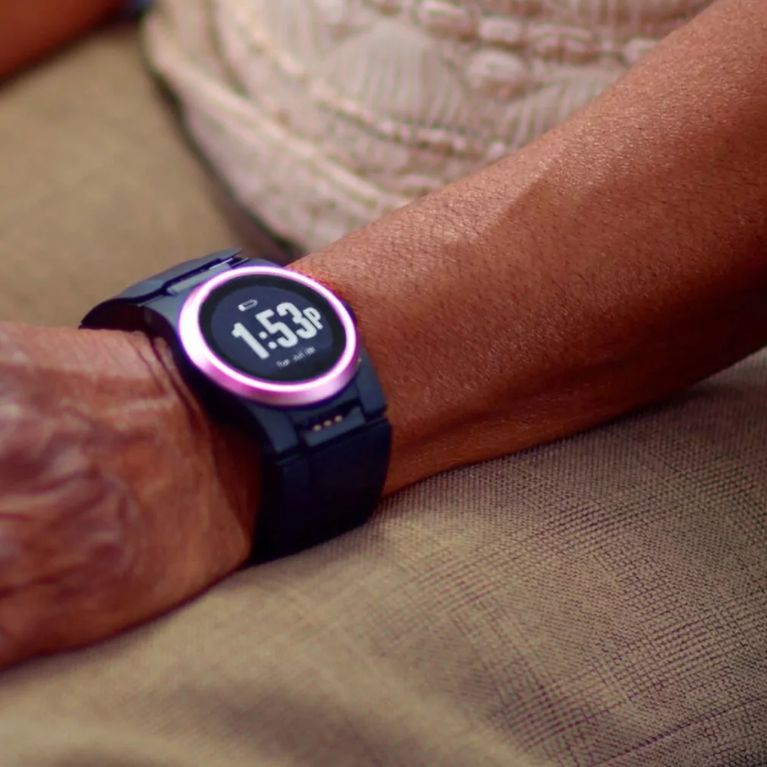
|
|
| Alert1 On-the-Go Wristband | Medical Guardian MGMini Lite | LifeFone At-Home & On-the-Go VIP Flex® | Bay Alarm Medical SOS Micro | UnaliWear Kanega Watch | |
| Rating | |||||
| Price (monthly) | $38.95 | $44.95 | $43.95 | $29.95 | $79.95 |
| Equipment fee | $0 | $149.95 | $0 | $99 | $299 |
| Fall detection | Yes, $10/month | Yes, $10/month | Yes, $5/month | Yes, $10/month | Yes, included |
| Caregiver app | No | Yes | No | Yes | No |
| Location tracking | No | Yes | Yes | Yes | No |
The Medical Guardian MGMini Lite is the same device as the Alert1 On-the-Go Wristband but includes a caregiver app and GPS location tracking. Its monthly fee is higher than Alert1’s, and there’s a $150 extra equipment fee.
The LifeFone At-Home & On-the-Go VIP Flex also has a higher monthly fee than Alert1, but it has $5 fall detection (the lowest in the industry). Like Alert1, LifeFone doesn’t offer a caregiver app or location tracking for this device.
The Bay Alarm Medical SOS Micro is a new model that replaced the SOS Mobile. It’s the same wristband Alert1, Medical Guardian, and LifeFone offer. Bay Alarm has the lowest monthly monitoring fee, $30, but there is a $99 equipment fee. There’s also a free caregiver app and GPS location tracking.
The UnaliWear Kanega Watch is a medical alert watch without a touchscreen or many extra features, which are included with most watches. You navigate the watch with your voice or the side button. The Kanega Watch has some of the industry’s highest monthly and equipment fees, but fall detection is included in the base price.
FAQs
How do Alert1 medical alert systems work?
Alert1 medical alert systems connect to a 24/7 monitoring center when you press the help button or trigger fall detection. The monitoring center agent talks to you through the base unit’s or mobile system’s two-way speaker. Depending on the situation, the agent dispatches emergency responders, contacts loved ones, or both.
How much do Alert1 medical alert systems cost?
Alert1 costs $28.95–$58.95 per month, depending on the medical alert system you choose. With an annual subscription, you can save nearly $10 on monthly monitoring. Fall detection is available for $10 per month. Shipping is free, but every package has a $19.95 one-time activation fee.
Can insurance pay for Alert1?
Does Alert1 have fall detection?
Yes, fall detection is available for all Alert1 medical alert systems for $10 per month.
Our experts
Dr. Swathi Varanasi
Dr. Swathi Varanasi, or Dr. Swathi for short, is a pharmacist passionate about the intersection of personalized medicine and innovation. Dr. Swathi received her Doctor of Pharmacy (PharmD) at the Medical University of South Carolina and Bachelor of Arts (BA) at Carleton College. She co-founded and was the first-ever healthcare professional in the US to complete postdoctoral residency training in integrative medicine and preventative health. She also completed a postdoctoral fellowship in Medical Affairs in biotech and has training in nutrition from Cornell University.
Krista Manning
Krista Manning is an accomplished medical copy editor and fact-checker who stands out in the pharmaceutical, health, and wellness domains. With a meticulous eye for detail and a command of medical language, Krista ensures the accuracy and clarity of content. Beyond her professional expertise, Krista is an advocate for mental health awareness. Recognizing the crucial intersection of psychological and physical well-being, she actively contributes to projects that promote mental health awareness within the healthcare narrative. Krista’s commitment extends beyond the pages she edits, emphasizing the holistic nature of health communication.

Emily Breaux
Fortune Recommends Writer
About Author
Emily is a health and wellness writer with a background in marketing and secondary education. She enjoys covering wellness topics that help readers navigate aging, caregiving, sleep, and nutritional health. Emily specializes in medical alert systems and has hand-tested more than 20 devices. Her work has been featured in National Council on Aging, HelpGuide, AgingInPlace.org, and MarketWatch.
Emily is based in New Orleans and enjoys neighborhood walks, practicing yoga, performing in local theatre productions, and finding her next read at the library.
Sources
- U.S. Center for Disease Control and Prevention. Facts About Falls. Accessed October 9, 2024
- National Institute on Aging. Preventing Falls at Home: Room by Room. Accessed October 6, 2024
- Weight of Stuff. 11 Common Items That Weigh About 2 Ounces (Oz). Accessed October 9, 2024.
- VSi Parylene. The Important Differences Between ‘Water-Resistant’, ‘Waterproof’, and ‘IPX-Rated Waterproof.‘ Accessed October 9, 2024.
- Broadley, R. W., Klenk, J., Thies, S. B., Kenney, L. P. J., Granat, M. H. Methods for the Real-World Evaluation of Fall Detection Technology: A Scoping Review. Sensors. 2018; 18(7). doi: 10.3390/s18072060
- Moreland, B. L., Kakara, R., Haddad, Y. K., Shakya, I., Bergen, G. A Descriptive Analysis of Location of Older Adult Falls That Resulted in Emergency Department Visits in the United States, 2015. American Journal of Lifestyle Medicine. 2021; 15(6): 590–597. DOI: 10.1177/1559827620942187
- Alzheimer’s Association. Wandering. Accessed October 7, 2024.
- MeetCaregivers. Understanding the Different Types of Caregivers. Accessed October 7, 2024.
- WebMD. What Are the Activities of Daily Living (ADLs)? Accessed October 7, 2024.
- Medicare.gov. Parts of Medicare. Accessed October 8, 2024.
- Medicare.gov. Your Health Plan Options. Accessed October 8, 2024.
